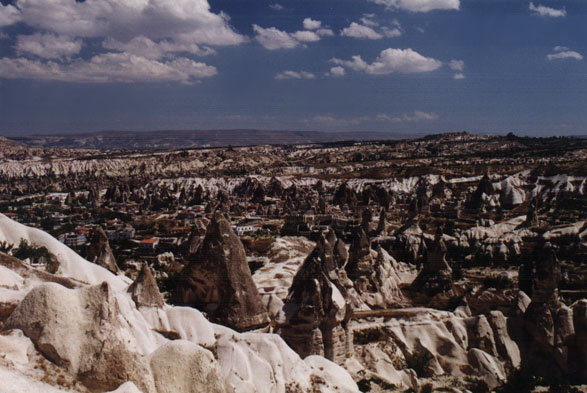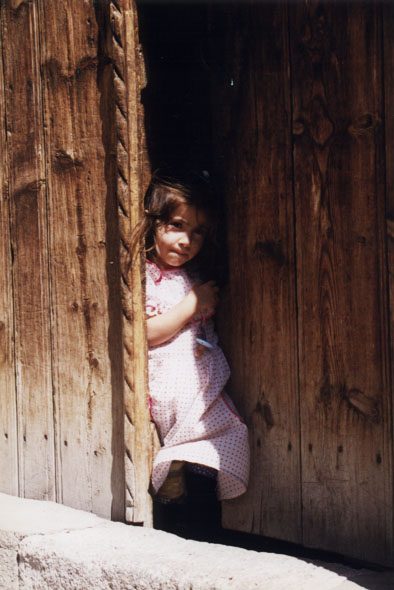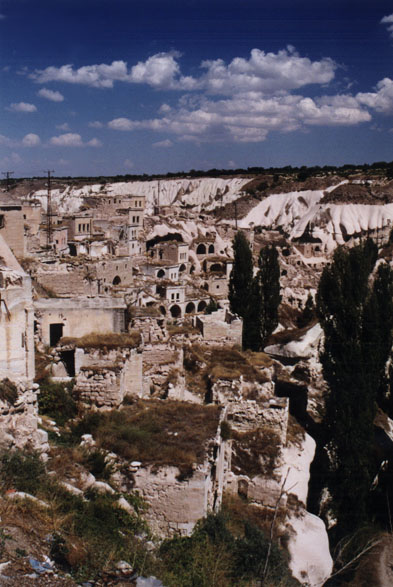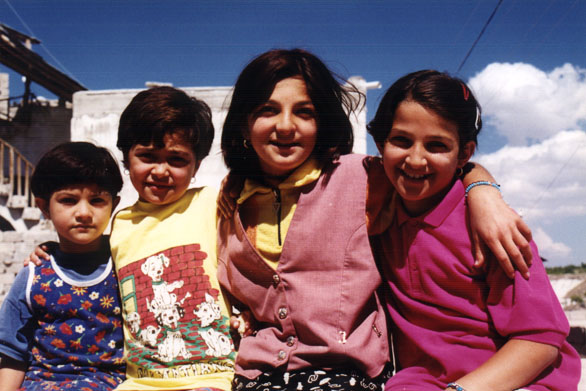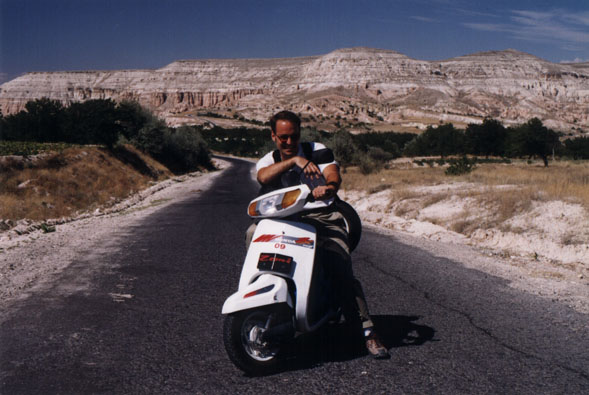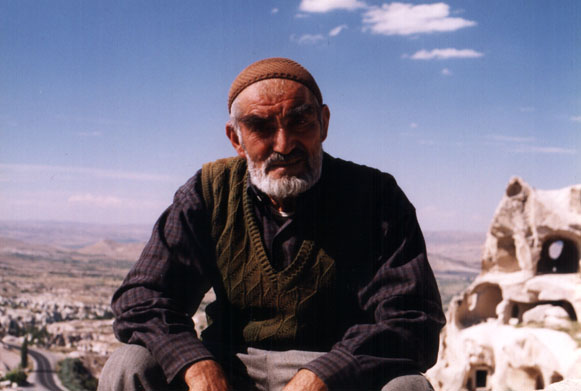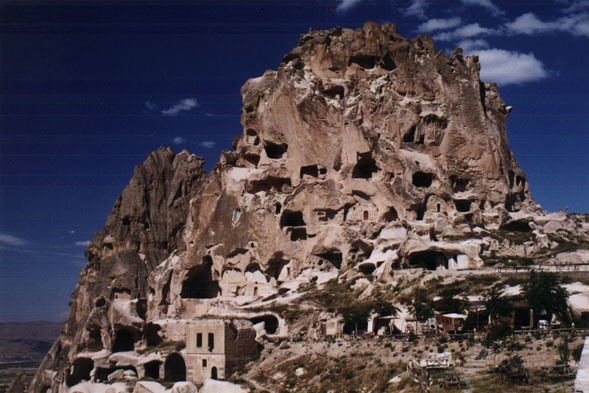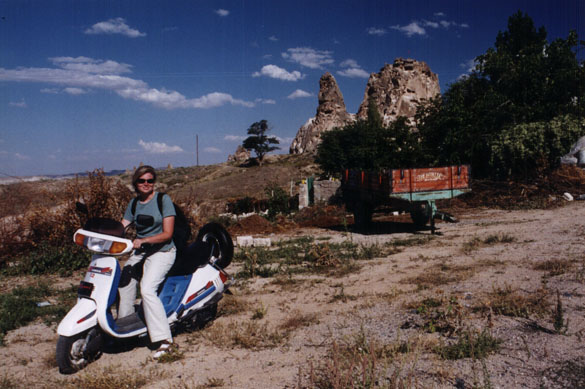

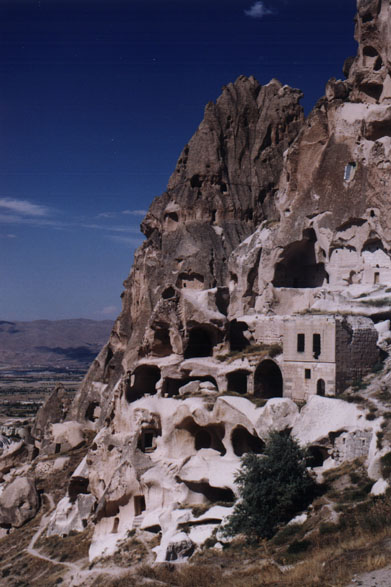 |
Uçhisar Kalesi, Cappadokia Cappadokia |
Susanne and I slept in until after 9am -- unusually late for us in Turkey. The last several days had been exhausting for both of us, so we planned to take it easy for the morning. We spent a long breakfast at the Vegemite Cafe, where Susanne took pictures of Abdullah, the son of the cafe owner. Abdullah posed happily for each shot, picking up one of his puppies for that added dose of cuteness.
"Ask him how old he is," Susanne requested.
"Kaç yasindasiniz, Abdullah?" I asked.
"On," he replied. "On dokuz."
"That's a little strange," I said to Susanne. "He said he was 10, but then he said 19. I think what he meant was 10-9, as in he was almost ten years old."
In the back of the cafe I noticed Abdullah's teenaged brother tuning a long-necked stringed instrument. The neck was about three feet long and it had a small, gourd-like body at one end. Since Susanne was busy taking pictures, I decided to investigate.
"Bu ne?"
"It is a saz," he replied in English. "It is a popular Turkish instrument."
"Do you play saz?" I asked.
"Biraz," he said. "Only a little. I have played for two months." The young man began to strum away at the saz, playing a traditional Turkish folk tune. It sounded like a Middle Eastern banjo, though about two octaves lower.
"Çok güzel,"
"It's okay," he replied, a little embarrassed. "I must practice more."
On the whole, this course of action sounded downright miserable to us, so we decided to invest in a package tour from Göreme. The standard tour would take you to Kahta on the first day, stopping at several notable sites along the way. The next morning we would then visit Nemrut Dagi before continuing on to the city of Urfa. After touring Urfa for the rest of the day, the group would then return to Cappadokia. Since Susanne and I intended to visit Urfa and then head further east towards Lake Van, we hoped it would be possible to join a tour for two days and then split off in Urfa before the group returned to Göreme.
Susanne and I visited Hiro Tours, which had arranged our Ilhara Valley trip the previous day. Ahmed the pseudo-Australian Turk
greeted us again and brought us into his office. Unfortunately his company didn't have a scheduled tour to Nemrut that week but he offered to arrange one through another company. Since I knew this would only jack up the price for us, I suggested to Susanne we look elsewhere.
"Did you see his desk?" Susanne asked me as we left.
"No," I replied. "What did I miss?"
"That guy had 15 pictures of himself under a piece of glass. How arrogant!"
"How do you know there were 15 of them?" I wondered.
"I counted while you and he talked," she explained. "He must really love himself."
Across the street we stopped at the Ötüken Voyage travel agency, which advertised "Nemrut Tour Every Friday" on a sign out front. We talked for a while with a Turkish man who spoke English with a French accent. He said there would be a tour leaving tomorrow, and at that particular moment there were only two people signed up for it. I told him we would think about and get back to him late in the afternoon.
Susanne and I could now get down to our main objective for the day: renting a pair of motorscooters. For years Susanne had talked about the wonderful time she and her sister had once spent riding motorbikes around Hawaii. I had never been on a motorbike before, and she convinced me that Cappadokia would be the perfect place to try it for the first time.
Just uphill from the otogar we waited at a small shop that specialized in bikes as two Australian women in string bikini tops finished their riding instructions. Susanne and I were both surprised that women would actually go around local villages in bikinis -- Cappadokia was a far cry from the Aegean party scene, and dressing this way had to be an insult to many Turks. Eventually the Aussies took off on their bikes and gave us a chance to check out two bikes for ourselves. Each scooter cost just under five million lira for four hours and required our passports as deposit. A woman at the shop explained how to start and stop the bike, as well as how to park it. Susanne took off down the street as soon as she mounted her motorbike. I, on the other hand, surged directly towards a median and almost crashed before I got a handle on how to hit the brakes. Feeling a bit more confident now that I had managed to save the bike, I gingerly turned the front wheel towards the street and hit the gas. I was soon on my way, riding down the sunny streets of Göreme with Susanne leading the way.
Susanne and I surged uphill as a warm wind blew through our hair. Though we had yet to arrive anywhere interesting I still felt a sense of exhilaration at the prospect of cruising around Cappadokia for the afternoon, free to ride wherever we wanted.
I soon caught up with Susanne and saw the huge grin on her face. She was truly in her element.
"Mind if I take the lead?" I yelled to her over the din of the whirling engines.
"Be my guest," she yelled back.
I rotated the handlegrip and rushed past Susanne's motorbike. I had no idea where we would end up, though I knew it was going to be a great afternoon.
As we rode towards the town of Uçhisar we noticed a sign for the Panorama Cafe, a corrugated tin roof restaurant with a stunning view of the Göreme Valley. We steered our bikes into a gravel parking lot in order to take some pictures but had great difficulty manouvering over the stones. Neither of us were able to park the bikes since the gravel wouldn't give us the grounding to flip the bike onto its kickstand. An old man noticed our predicament and came over to help, tugging each bike until we finally managed to get the kickstands in place. As kind as it was for him to help us, it almost wasn't worth his time since we only spent about five minutes soaking up the view. We were both anxious to go exploring and find someplace new, so we soon returned to our bikes and hit the road after a brief struggle with those infernal kickstands.
 I asked the teenager.
I asked the teenager. I said to him as he played.
I said to him as he played.
After breakfast Susanne and I walked towards the otogar to stop by several tour agencies in hope of some of advice regarding how we should get to our next destination, Nemrut Dagi. The great mountain temple of Nemrut Dagi is one of most unusual sites in all of Turkey, but as fate would have it, the mountain's remoteness made it a frustratingly long journey. If we were to get their by bus, we would have to catch a bus from here to Kayseri, then change buses for Adiyaman. Upon arriving in Adiyaman six hours later, we'd have to wait around for another bus to Kahta, a grimy oil town that serves as the closest base to Nemrut. From there, we'd have to make arrangements for a taxi or tour group to take us to the top of the mountain at 3am in order to make it to the summit for sunrise.
to stop by several tour agencies in hope of some of advice regarding how we should get to our next destination, Nemrut Dagi. The great mountain temple of Nemrut Dagi is one of most unusual sites in all of Turkey, but as fate would have it, the mountain's remoteness made it a frustratingly long journey. If we were to get their by bus, we would have to catch a bus from here to Kayseri, then change buses for Adiyaman. Upon arriving in Adiyaman six hours later, we'd have to wait around for another bus to Kahta, a grimy oil town that serves as the closest base to Nemrut. From there, we'd have to make arrangements for a taxi or tour group to take us to the top of the mountain at 3am in order to make it to the summit for sunrise.
